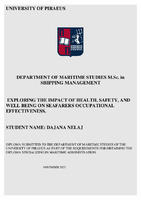Exploring the impact of health, safety, and well being on seafarers occupational effectiveness

Master Thesis
Author
Nelaj, Dajana
Νελάι, Νταϊάνα
Date
2023-11View/
Keywords
Seaman ; Well being ; RiskAbstract
This research delves into the experiences of seafarers concerning their health, safety, and well-being, examining how these aspects are influenced by the organization and structure of their employment at sea. Maritime work comes with its own set of unique characteristics, including long work hours, unpredictable schedules, and social isolation—features that have been linked to declines in employee health, safety, and well-being in other sectors. Additionally, the landscape of maritime employment has undergone significant transformation in recent years; most modern-day seafarers are now contracted through third-party agencies on a temporary basis, a practice that has been linked to diminished occupational health outcomes in land-based industries.
To examine these factors, the study employs a mixed-methods research design that incorporates both semi-structured interviews with seafarers from four different ships and a secondary analysis of safety data from three shipping companies. The research found that seafarers' health, safety, and well-being were closely tied to the organization of their employment and varied according to specific phases within a work tour. Specifically, negative impacts on well-being were most noticeable both early and late in a tour, while safety outcomes improved notably in the last week of duty, especially for those working on offshore vessels.
Further qualitative scrutiny revealed significant links between adverse health, safety, and well-being experiences and the organization of seafaring employment. The study identified a lack of effective strategies for managing these critical factors, highlighting significant disparities between the experiences of seafarers and the expectations set by their shore-based management. Moreover, the mechanisms for reporting such discrepancies were found to be insufficient.


